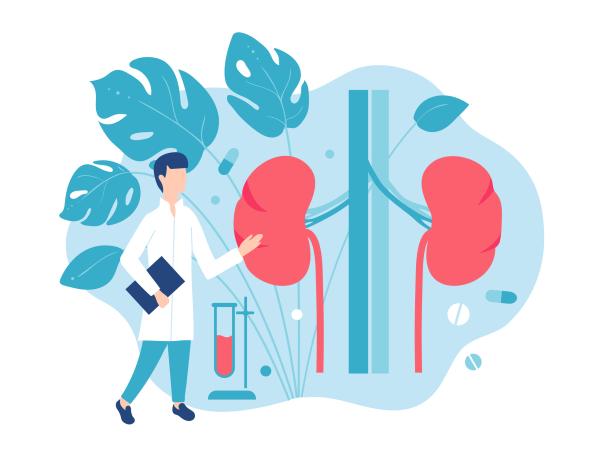Kidney disease, or renal disease, encompasses a range of conditions that impair the kidneys' vital functions. These bean-shaped organs filter blood, removing waste and excess fluids, regulating electrolytes and blood pressure.

Starting Saturday, December 14, 2024, the entrance to the QEII Halifax Infirmary Emergency Department has changed to 1840 Bell Road. Learn more.
Please plan for extra travel time when coming to the QEII Halifax Infirmary. As of February 18, the easternmost, northbound lane of Robie Street will be closed for the duration of the Halifax Infirmary Expansion Project, leaving two lanes open. Expect potential delays and consider alternative routes when possible.
Kidney disease, or renal disease, encompasses a range of conditions that impair the kidneys' vital functions. These bean-shaped organs filter blood, removing waste and excess fluids, regulating electrolytes and blood pressure.

Chronic kidney disease (CKD) develops over time, often due to conditions like diabetes or hypertension, leading to gradual loss of function.
Acute kidney disease is a sudden onset of kidney damage, often triggered by infections or toxins. Symptoms may include fatigue, swelling, and changes in urine output. Early detection is crucial, as advanced stages may require dialysis or transplantation. Lifestyle changes and medications can manage symptoms and slow progression.
If you are new to Nova Scotia or don't know where to begin, please contact the Nova Scotia Health Renal Program for all of your questions and concerns.
Hemodialysis is a life-sustaining medical procedure for individuals with kidney failure. During this process, blood is circulated through a machine that acts as an artificial kidney, removing waste products and excess fluids. The cleansed blood is then returned to the body. Typically conducted thrice weekly, hemodialysis helps maintain electrolyte balance and fluid levels. Although demanding, it provides a critical lifeline for those awaiting kidney transplants or unable to undergo other forms of renal replacement therapy.
Nephrology is the specialized branch of medicine dedicated to the study and treatment of kidney-related disorders. Nephrologists, the medical professionals in this field, diagnose and manage conditions such as kidney diseases, electrolyte imbalances, and hypertension. They employ a range of diagnostic tools, including blood and urine tests, to assess kidney function. Nephrology covers various treatment modalities, from medications to renal replacement therapies like dialysis and kidney transplantation, ensuring comprehensive care for patients with renal issues.

The Nova Scotia Health Renal Program cover all areas of kidney disease including early identification of at risk individuals, treatment options for management and end-stage kidney disease including end-of-life care. The program is committed...
Facility Dialysis Units provide hemodialysis in a hospital setting to inpatients, outpatients and patients in intensive care. They provide support to satellite dialysis and home dialysis units in their program.
The Home Dialysis Unit provides home dialysis training and management to individuals that wish to maintain their independence by performing their own dialysis (peritoneal or hemodialysis) at home.
The Chronic Kidney Disease (Renal) Clinic helps individuals preserve their kidney function, manage their kidney disease and prepare for treatment options.
The Nephrology/Transplant unit provides short-term, in-hospital care to patients with renal disease and pre/post-operative care for patients undergoing kidney transplant.
Hemodialysis is a treatment that uses a machine to filter your blood and remove waste and extra water from your blood. Topics include: what your kidneys do, what acute kidney failure is, what peritoneal dialysis is, what hemodialysis is, and how to live with kidney disease.
This pamphlet is for patients who are beginning dialysis. It explains what to expect when starting hemodialysis, common questions you may have, your hemodialysis schedule, and your hemodialysis health care team. Information about Patient Rights and Responsibilities, Patient Relations, and Ethics is included.
This pamphlet explains the procedure for having a non-tunneled hemodialysis catheter inserted and what to expect before, during and after the procedure.